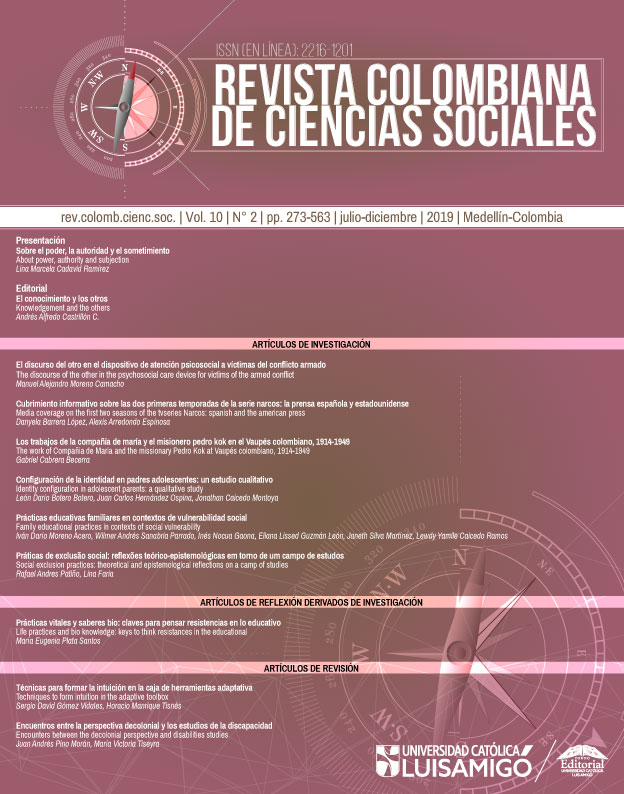The discourse of the other in the psychosocial care device for victims of the armed conflict
DOI:
https://doi.org/10.21501/22161201.2800Keywords:
War Victims, Social policy, Social program, Psychoanalysis, Social psychology, Psychosocial care.Abstract
The objective of this work is to characterize the prescriptive dimension of the psychosocial care strategy for victims of the armed conflict in Colombia. It is oriented theoretically and methodologically by the perspective of governmentality studies in articulation with the principles of Lacanian discourse analysis. The results point to the identification of ideals on the integral reparation to the victims, and to the analysis of the explicit and implicit messages that allow to place the demand of the institutional Other. This allows us to conclude that the integral reparation to the victims of the armed conflict in Colombia is part of the current logic of management of the social issue, as a care policy that has the character of an official response from the State to settle with the population. In this context, frontline professionals are the bearers of the message that the State addresses to the recipients of the program and are called to act as experts in the recovery of psychosocial damages caused by sociopolitical violence, in order to achieve the ideal of rehabilitation.Downloads
References
Agamben, G. (2011). ¿Qué es un dispositivo? Sociológica, 26(73), 249–264. Recuperado de http://www.scielo.org.mx/pdf/soc/v26n73/v26n73a10.pdf
Alemán, J. (2016). Horizontes neoliberales de la subjetividad. Buenos Aires, Argentina: Grama.
Castro-Gómez, S. (2015). Historia de la gubernamentalidad I (2a ed.). Bogotá, Colombia: Siglo del Hombre Editores.
Castro-Sardi, X., y Olano, J. (2018). Reparación y escucha del sujeto-víctima: Discursos y prácticas en la intervención psicosocial con víctimas del conflicto armado en Colombia. Revista Colombiana de Ciencias Sociales, 9(1), 85–108. doi: https://doi.org/10.21501/22161201.2610
Foucault, M. (1991). Saber y verdad. Madrid, España: La Piqueta.
Foucault, M. (2001). Estética, ética y hermenéutica. Vol 3: Obras escogidas. Barcelona, España: Paidós.
Foucault, M. (2007). Nacimiento de la biopolítica. Curso en el Collège de France (1978-1979). Buenos Aires, Argentina: Fondo de Cultura Económica.
Galaz Valderrama, C., y Montenegro Martínez, M. (2015). Gubernamentalidad y relaciones de inclusión/exclusión: los dispositivos de intervención social dirigidos a mujeres inmigradas en España. Universitas Psychologica, 14(5), 1667–1680. doi: https://doi.org/10.11144/Javeriana.up14-5.grie
González Castro, P. (2014). Análisis lacaniano del discurso: una herramienta metodológica “alternativa, innovadora y subversiva”. Teoría y Crítica de La Psicología, 4, 51–59. Recuperado de http://teocripsi.com/documents/4GONZALEZ.pdf
Ibáñez, T. (2001). Municiones para disidentes. Barcelona, España: Gedisa.
Lacan, J. (2009). De una cuestión preliminar a todo tratamiento posible de la psicosis. En Escritos 2 (pp. 509–557). Buenos Aires, Argentina: Siglo XXI.
Lacan, J. (1992). El seminario, libro 17. El reverso del psicoanálisis. Buenos Aires, Argentina: Paidós.
Ministerio de Salud y Protección Social. (2017). Estrategia de atención psicosocial a víctimas del conflicto armado en el marco del programa de atención psicosocial y salud integral a víctimas - PAPSIVI. Marco conceptual atención psicosocial individual, familiar, comunitaria y colectiva étnica. (Volumen 1). Bogotá, Colombia: Ministerio de Salud y Protección Social. Recuperado de http://www.iets.org.co/victimas/PublishingImages/Paginas/PAPSIVI/V1.%20Marco%20conceptual%20Atenc%20Psicosocial%20070516.pdf
Moreno, M. A. (2013). Psicoanálisis e intervención social. CS En Ciencias Sociales, (11), 115–142. doi: https://doi.org/10.18046/recs.i11.1568
Moreno Camacho, M. A., y Díaz Rico, M. E. (2016). Posturas en la atención psicosocial a víctimas del conflicto armado. El Agora USB, 16(1), 193–213. Recuperado de http://www.scielo.org.co/scielo.php?script=sci_arttext&pid=S1657-80312016000100010&lang=pt
Moreno Camacho, M. A., y Molina Valencia, N. (2018). La intervención social como objeto de estudio: discursos, prácticas, problematizaciones y propuestas. Athenea Digital, 18(3), 1-29. doi: https://doi.org/10.5565/rev/athenea.2055
Parker, I. (2002). Critical discursive psychology. London: Palgrave Macmillan.
Parker, I. (2014a). Conclusion. Lacanian domains of practice and forms of event in analysis. In I. Parker & D. Pavón-Cuéllar (Eds.), Lacan, discourse, event: New psychoanalytic approaches to textual indeterminacy (pp. 338–346). London: Routledge.
Parker, I. (2014b). Lacan discourse analysis. Seven elements. In I. Parker & D. Pavón-Cuéllar (Eds.), Lacan, discourse, event: New psychoanalytic approaches to textual indeterminacy (pp. 38–51). London: Routledge.
Parker, I. (2014c). Negotiating text with Lacan. Theory in practice. In I. Parker & D. Pavón-Cuéllar (Eds.), Lacan, discourse, event: New psychoanalytic approaches to textual indeterminacy (pp. 52–65). London: Routledge.
Parker, I. (2015). Psychology after discourse analysis. Concepts, methods, critique. London: Routledge.
Parker, I., & Pavón-Cuellar, D. (2014). Lacan, discourse, event: New psychoanalytic approaches to textual indeterminacy. London: Routledge.
Pavón-Cuéllar, D. (2010). From the conscious interior to an exterior unconscious. Lacan, discourse analysis and social psychology. London: Karnac.
Pavón-Cuéllar, D. (2014). From the word to the event. Limits, posibilities and challenges of lacanian discourse analysis. In I. Parker & D. Pavón-Cuéllar (Eds.), Lacan, discourse, event: New psychoanalytic approaches to textual indeterminacy (pp. 325–337). London: Routledge.
República de Colombia. (2012). Ley de víctimas y restitución de tierras y sus decretos reglamentarios. Bogotá: Ministerio de Justicia y del Derecho.
Rose, N. (1996). Inventing ourselves: Psychology, power and personhood. New York: Cambridge University Press.
Rose, N. (1999). Governing the soul: the sahping of the private self (2nd ed.). London: Free associations.
Rose, N., & Miller, P. (2008). Governing the present: administering economic, social and personal life. Cambridge: Polity Press.
Safatle, V. (2016). O circuito dos afetos. Corpos políticos, desamparo e o fim do individuo. Sao Paulo: Autêntica.
Savio, K. (2015). Aportes de Lacan a una teoría del discurso. Folios, (42), 43–54. Recuperado de http://www.scielo.org.co/pdf/folios/n42/n42a04.pdf
Downloads
Published
How to Cite
Issue
Section
License
Copyright (c) 2019 Revista Colombiana de Ciencias Sociales

This work is licensed under a Creative Commons Attribution-NonCommercial-NoDerivatives 4.0 International License.
La revista y los textos individuales que en esta se divulgan están protegidos por las leyes de copyright y por los términos y condiciones de la Licencia Creative Commons Atribución-No Comercial-Sin Derivar 4.0 Internacional.











